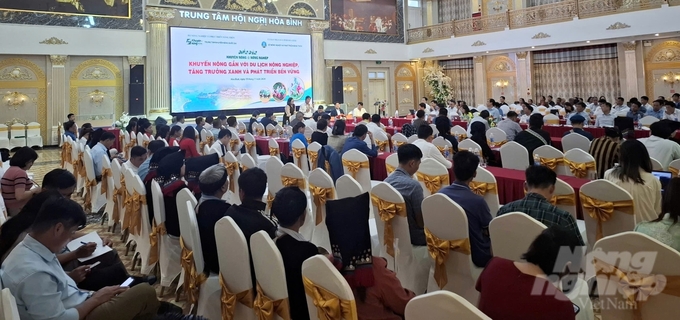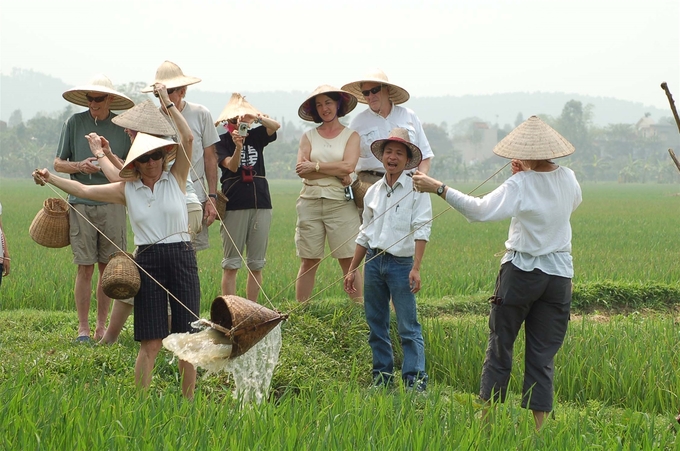November 26, 2025 | 18:11 GMT +7
November 26, 2025 | 18:11 GMT +7
Hotline: 0913.378.918
November 26, 2025 | 18:11 GMT +7
Hotline: 0913.378.918
On November 19, within the framework of the 2nd Da River Fish and Shrimp Festival 2024 in Hoa Binh Province, the Hoa Binh Provincial People's Committee, in collaboration with the National Agricultural Extension Center, organized the "Agricultural Extension@Agriculture Forum" with the theme "Agricultural extension linked with agricultural tourism, green growth and sustainable development".

According to Mr. Le Quoc Thanh (standing), the current question in the development of agricultural tourism is: "Will tourism professionals learn how to do agriculture, or will agricultural professionals learn how to do tourism?". Photo: Trung Quan.
At the forum, many participants emphasized that in several regions, agriculture remains the dominant sector, with agricultural land making up over 80% of the total natural area. Furthermore, numerous farming models are actively operating, creating a solid foundation for the development of agricultural tourism.
The development of agricultural tourism offers farmers the opportunity to transition from traditional farming to a more integrated approach that combines agriculture with leisure and experiential activities. This shift not only contributes to economic growth but also creates employment opportunities for local laborers. It provides a sustainable solution by reducing the trend of rural-urban migration. Additionally, agricultural tourism fosters local integration and promotes export opportunities. As the sector expands, agricultural tourism is poised to become increasingly popular, offering a wide range of benefits and opportunities for growth.
Ms. Nguyen Thi Lan Huong, Director of the Institute for Tourism Development Research under the Ministry of Culture, Sports, and Tourism, emphasized that, despite the many advantages and opportunities for agricultural tourism, there are still significant challenges and barriers to its development. The current legal frameworks, including the Tourism Law, Land Law, Forestry Law, Construction Law and Environmental Protection Law, contain many issues that have yet to be harmonized. These discrepancies prevent the establishment of a clear and open business environment, making it difficult for local communities to fully participate in tourism activities. The absence of concrete regulations has led to confusion and operational difficulties for local authorities who are tasked with managing these activities.
Professor Dr. Bui Thi Nga from the Vietnam National University of Agriculture pointed out that tourism products are often based on the unique strengths and special features of each locality, such as agricultural products, landscapes, historical and cultural heritage, and local cuisine. However, without a consistent effort to maintain quality and continuously innovate, these tourism products can quickly become repetitive and lose their appeal to visitors.

At the forum, many delegates pointed out that the development of agricultural tourism is still facing numerous challenges in practice. Photo: Trung Quan.
In addition, the human resources available for the development of agricultural tourism are still limited both in terms of quantity and quality. Most of the people involved in agricultural tourism are farmers who balance their time between traditional farming and tourism activities. These farmers are primarily trained in agriculture and may not possess the necessary skills or experience to serve tourists in a professional manner. Additionally, many do not focus on or recognize the importance of aligning their agricultural production with the development of tourism, which hinders the effective integration of both sectors.
According to a representative from the Institute of Policies and Strategies for Agricultural and Rural Development (Ministry of Agriculture and Rural Development), in order to develop agricultural tourism in rural areas, the approach should be based on the principle of “diversity within unity”. Agricultural tourism should be integrated into the broader national tourism development strategy, ensuring that it complements and enhances the overall tourism system of the country.
The development plan must be based on the unique resources of agriculture and rural areas, including the value of natural landscapes and intangible cultural heritage such as festivals, folk arts, customs, handicrafts, and the cultures of various ethnic groups. These elements form a critical foundation for organizing a systematic approach to this highly potential form of tourism.
Additionally, it is necessary to address the challenges related to mechanisms and policies, especially those concerning land use and attracting investment. Strengthening the link between businesses and local communities is crucial, providing the conditions for rural communities to actively participate in the tourism value chain. It is also important to integrate resources from rural development programs, infrastructure, cultural, and environmental projects to optimize the development of agricultural and rural tourism.

To develop agricultural and rural tourism, it is essential to follow the principle of "diversity within unity".
According to Mr. Le Quoc Thanh, Director of the National Agricultural Extension Center, the center is currently implementing 10 agricultural extension projects. These initiatives not only aim to transfer advanced agricultural production techniques but also integrate agricultural production with tourism activities. This combined approach helps increase added value, improve production efficiency, protect the ecological environment, and foster sustainable agricultural development under the concept of "ecological agriculture, modern rural areas, and civilized farmers".
In particular, to assist farmers in addressing the question of whether "those in tourism should learn agriculture or those in agriculture should learn tourism" in order to integrate multiple values, increase income, improve living standards, and enhance the rural landscape, the agricultural extension force from the central to local levels has been proactively evolving. Rather than merely transferring technical knowledge, agricultural extension officers now work alongside farmers to ensure that high-quality, safe agricultural products are closely linked with tourism. This approach helps to fully harness the unique strengths and potential of each locality, creating sustainable livelihoods for farmers.
Translated by Phuong Linh

(VAN) The Disaster Prevention Community Fund has mobilized resources to install automatic rain gauge and flood warning stations, helping localities proactively respond to natural disasters more effectively.

(VAN) Thanh Hoa province has substantial potential to supply carbon credits, opening opportunities for green economic development, enhancing agriculture and forestry value.
/2025/11/25/1741-0-nongnghiep-221736.jpg)
(VAN) The application of AI helps identify emission sources and assess air pollution developments, thereby supporting management agencies in issuing timely and appropriate control policies.

(VAN) Viet Nam will develop its carbon market not only by prioritizing transaction volumes but also by transitioning to a low-emission economy.
/2025/11/25/3413-1-171953_261.jpg)
(VAN) Experts from the Vietnam Academy of Science and Technology have conducted surveys to identify the causes of landslides in Lam Dong province and propose natural disaster prevention solutions.

(VAN) The HNT reservoir operation support system, developed by WeatherPlus in collaboration with Kyushu Electric Power, enables real-time rainfall forecasting, inflow forecasting, and flood-release simulations.

(VAN) Dr. Cao Duc Phat stated that the localization of early natural disaster warning technologies will help meet practical requirements and create favorable conditions for domestic research institutions and businesses to develop.